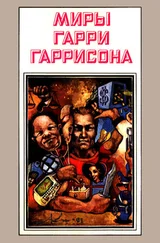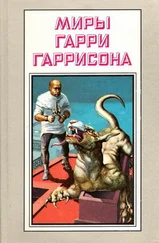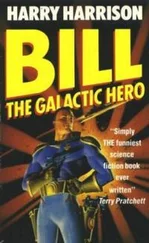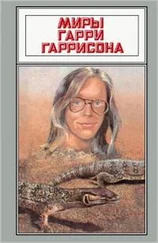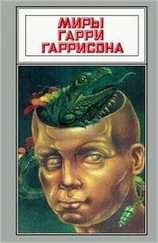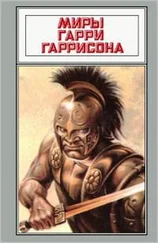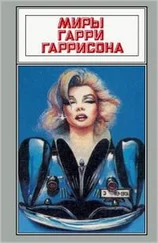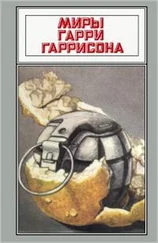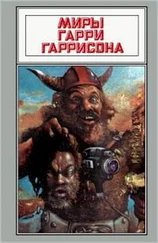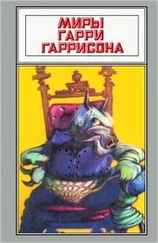Гарри Гаррисон - Galactic Dreams
Здесь есть возможность читать онлайн «Гарри Гаррисон - Galactic Dreams» весь текст электронной книги совершенно бесплатно (целиком полную версию без сокращений). В некоторых случаях можно слушать аудио, скачать через торрент в формате fb2 и присутствует краткое содержание. Жанр: Фантастика и фэнтези, на английском языке. Описание произведения, (предисловие) а так же отзывы посетителей доступны на портале библиотеки ЛибКат.
- Название:Galactic Dreams
- Автор:
- Жанр:
- Год:неизвестен
- ISBN:нет данных
- Рейтинг книги:5 / 5. Голосов: 1
-
Избранное:Добавить в избранное
- Отзывы:
-
Ваша оценка:
- 100
- 1
- 2
- 3
- 4
- 5
Galactic Dreams: краткое содержание, описание и аннотация
Предлагаем к чтению аннотацию, описание, краткое содержание или предисловие (зависит от того, что написал сам автор книги «Galactic Dreams»). Если вы не нашли необходимую информацию о книге — напишите в комментариях, мы постараемся отыскать её.
Galactic Dreams — читать онлайн бесплатно полную книгу (весь текст) целиком
Ниже представлен текст книги, разбитый по страницам. Система сохранения места последней прочитанной страницы, позволяет с удобством читать онлайн бесплатно книгу «Galactic Dreams», без необходимости каждый раз заново искать на чём Вы остановились. Поставьте закладку, и сможете в любой момент перейти на страницу, на которой закончили чтение.
Интервал:
Закладка:
GALACTIC DREAMS
Harry Harrison
A WRITER’S LIFE
I have recently been reading Brian W. Aldiss’s autobiographical work titled Bury My Heart at W. H. Smith’s. (Smith’s is the largest chain of booksellers in Great Britain, not a bespoke graveyard, and the heart referred to is a metaphorical one.) The book wanders like a pleasant stream through green meadows and dark woods, just as a writer’s life does. People enter this life and leave; there are both good and bad times. But hovering over the physical life of its author are insubstantial spirits; the books and stories that have been summoned to life by this fascinating and talented writer. From life comes art; art becomes life.
From the outside a writer’s life might appear uncommonly dull. Rise in the morning and proceed to the study. Then with pen, pencil, typewriter, computer sit like a monk in a cell for long hours. The only movement the flashing or plodding fingers.
But it’s not like that at all. It is wildly exciting. The work on the page is reality, experience, knowledge, imagination transmogrified and transformed into art. Yes, art, the word should not be shied away from. Anyone can type “With a gentle sigh …” on a sheet of paper. But it ceases to be a typing exercise when supposedly wise publishers force money upon one for simply writing those words. It must be an art — a black one perhaps — that makes them do something like that.
I wrote those words in Mexico in 1956. Then in 1957 and 1958, in London, Italy and Long Island, New York, I added sixty-four thousand, nine hundred and ninety-six more words to these four. And John W. Campbell bought these words, paying three cents for each one, and published them as a serial in his magazine Astounding Science Fiction.
Within a year Bantam Books bought these same words again and published them as a paperback book entitled Deathworld. My first novel. There were more to come.
The reasons why I wrote this book are clear enough; science fiction has always been my pleasure and enthusiasm. But what on earth was I doing in Mexico? Not to mention London or Anacapri.
And thereby hangs the tale. Life becomes art; art becomes life. One shapes the other always, forcefully and immutably.
We lived in New York in an air-conditioned apartment. My wife, Joan, was a successful dancer and dress designer before devoting most of her time to the family and our son Todd and our daughter Moira. I was a successful commercial artist, art director, editor, writer.
But I was writing for money not pleasure. It was like being a prison guard or an elevator operator. You did it to stay alive, not because you enjoyed it. Only the fiction, particularly the science fiction, gave me any pleasure and sense of purpose.
But in those penny and two-cent a word days you couldn’t live by writing science fiction. You would have to write — and sell! — at least two stories a week to earn as much as a shoe salesman. Impossible! As for writing a novel, earning no money at all for one or two years, that was simply out of the question. Many writers have written novels in their spare time while holding down a regular job. I could not do it. It fitted neither my temperament nor my work patterns. Joan and I discussed the problem at great length and came up with what appeared to be an obvious solution.
I would quit my job, we would give up the apartment, sell the air conditioner, put all our goods in storage and drive to Mexico. Todd, aged one, did not seem bothered about the idea.
His grandparents thought quite differently. As did all our friends. Words like “insane” and “impossible” were muttered about and occasionally shouted aloud. Perhaps they were right.
We did it anyway. Padded the backseat of our Anglia Ford 10 to make a playpen, tied the crib to the roof, filled the trunk with our belongings and drove south.
The funny part is that it worked. We only had a bit over $200, but that princely sum went a long way in Mexico in the 50’s. We drove farther south still until the paved road ended, turned back and stopped at the first town. Cuautla, Morelos. We rented a house there, learned to speak Spanish, drank Tequila at 75 cents a liter, and employed a full-time maid at $4.53 a month. I wrote on a tiny screened balcony with a view of growing banana trees just outside. My magazine articles were selling well back in New York. The income from one sale, that might have bought a good meal and a night in the theater in the Apple, supported us in Mexico for a month. Once I was ahead on article sales, some short science fiction written and sold — I took a deep breath and started the novel.
Mexico was warm, beautiful and comfortable. But the social life was nonexistent and the tropics no place to bring up a baby. So after one year, rich with experiences, tan of skin and slightly more solvent, we drove back to New York.
And continued on to England.
Many times many people, eyebrows raised, have asked me why I did this or that. Like driving to Mexico with an infant. Or going to Denmark for a one month visit and staying for seven years. My answer, quite often, is that it seemed like a good idea at the time. People with regular jobs, mortgaged homes, children in school and a pension hovering goldenly in the distance are often infuriated by this answer.
But it is a true one, not a glib or evasive answer. We were committed to the freelance life. And enjoyed living someplace else. For a writer it was paradise. Learning new languages, living in new cultures, responding to new realities, ideas, experiences. I am more than blessed that Joan shares my enthusiasms.
On the jacket of the German translation of one of my novels is a German expression. It refers to me as a Weltenbummler. Was I being called a world bum? Not nice. Professor T. A. Shippey, science-fiction scholar and linguist, set me right. “No, not a bum, Harrison — though others may think differently. It is an ancient and good German term, not too different from our word `apprentice.’
Or better `journeyman,’ as in journeyman printer. A novice working at a skilled trade would go from workplace to workplace, learning new skills and crafts.”
I think the Germans are right about me. Weltenbummler indeed. Everything new, different, interesting, educational becomes part of a writer’s life. It is all grist for the creative mill. Many times the connection is obvious; I wrote Captive Universe after living in Mexico, seeing the life there in the isolated villages, discovering how these people understood their world. ‘In Our Hands the Stars’ uses Denmark as a setting; the people, their attitude towards life, shape the structure of the novel.
Those are the obvious examples. But there are subtler threads in my writing, many times things that I am not aware of, that are pointed out by critics or friends. Or enemies? I do not wish to put down Peoria, home of that fine writer Philip Jose Farmer, but I do feel that there is more to the world than Peoria. I have lived for extended periods, for months and years, in a total of six countries. I have visited at least sixty more. I feel enriched by the experience. More important — I feel that my work has been enriched.
Circumstance, and residing outside my native country for some thirty-odd years, have certainly changed me. The way I think, the way I write. I am an internationalist now, feeling that no single country is better than another. Though there are certainly some that are worse. I speak Esperanto like a native, or as Damon Knight once said, “Harry speaks the worst English and the best Esperanto I have ever heard.”
I have traveled with this international language and made friends right around the globe.
Fragments from the traveler’s life: In Moscow, many years ago, a reader gave me one of my books in Russian. Not published, but in samizdat. That is, typed out by hand, circulated privately. Honor enough — and honor is about all an author can get out of Russia in the foreseeable future. Since the Soviets did not sign an important international copyright agreement, it is not illegal to steal foreign books and publish them there. I have recently discovered that I am the most pirated SF author in Russia. Which means the most popular foreign author. A boost for the ego; a sigh for the bank account.
Читать дальшеИнтервал:
Закладка:
Похожие книги на «Galactic Dreams»
Представляем Вашему вниманию похожие книги на «Galactic Dreams» списком для выбора. Мы отобрали схожую по названию и смыслу литературу в надежде предоставить читателям больше вариантов отыскать новые, интересные, ещё непрочитанные произведения.
Обсуждение, отзывы о книге «Galactic Dreams» и просто собственные мнения читателей. Оставьте ваши комментарии, напишите, что Вы думаете о произведении, его смысле или главных героях. Укажите что конкретно понравилось, а что нет, и почему Вы так считаете.
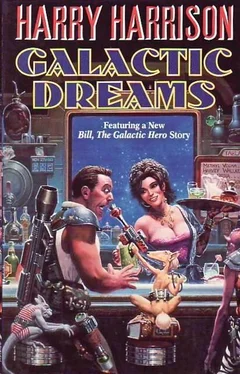
![Гарри Гаррисон - Bill, the Galactic Hero [= The Starsloggers]](/books/87536/garri-garrison-bill-the-galactic-hero-the-star-thumb.webp)
